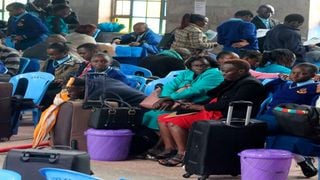
Students and their parents during admission of Form Ones at Moi Girls School in Nairobi on January 13, 2020. School heads are warning congestion will reach crisis levels if the government does not move to expand infrastructure before the end of next year.
Education
Premium
We’re not ready for Junior Secondary, say principals
Secondary schools are not adequately prepared for the transition from 8-4-4 to the competency based curriculum, with only one-and-half years before the pioneer CBC class joins junior secondary.
The schools will require significant preparation in terms of infrastructure, teacher training and development of teaching and learning content. Already, principals have warned the current congestion in secondary schools will reach crisis levels unless urgent measures are taken.
CBC implementation has been allocated only Sh1 billion in the next financial year.
This will, however, be mostly spent on training of teachers. Infrastructure for both primary and secondary schools was allocated Sh4.2 billion.
The chair of the Kenya Secondary Schools Heads Association (Kessha) Kahi Indimuli has warned that the congestion will reach crisis levels if the infrastructure is not expanded by 2023 when there will be a double intake as the Competency-Based Curriculum rolls out in secondary schools. Many schools were last week allocated more Form One students than their capacities.
CBC implementation
“There’s an increase of students across the board, even last year, we were given more students than our capacity. We have not increased the capacity of secondary schools in tandem with the learners leaving Standard Eight,” Mr Indimuli said.
The Nation has learnt that officials from the Ministry of Education, Kenya Institute of Curriculum Development and Kenya National Examinations Council are at a workshop in Machakos to come up with a plan for the CBC implementation. However, they have complained that they have to work without access to a report by a task force that recommended how the CBC should be implemented.
“We don’t know why the Cabinet Secretary doesn’t want the report released,” an official said.
Details about the cost, structure and policies guiding the transition are contained in the report which has never been made public, four months since it was launched. The task force was chaired by Prof Fatuma Chege who was later appointed Principal Secretary for the newly created State Department for the Implementation of Curriculum Reforms.
Learners who are in Grade 4 will be admitted to Grade 7, which is the first grade for junior secondary under the new system in January 2023. This will be after the crash programme that will see them cover curriculum content for two years in one-and-half years beginning in July this year.
The situation will be compounded by the double intake in January 2023 as the last 8-4-4 class will be joining Form One at the same time, resulting in congestion. A check with principals confirmed that no extra infrastructure has been put up or commissioned to take care of the many students.
Secondary education will significantly change under the CBC. Learners will enter secondary school after Grade 6 and will be relatively younger than in the current situation when they join after Standard 8. Junior secondary will comprise Grade 7, 8 and 9 after which learners will join senior secondary (Grade 10, 11 and 12).
More classrooms
The extra two classes in secondary will require that schools invest in more classrooms and for boarding schools, more dormitories.
President Uhuru Kenyatta announced on February 2, 2021 that junior secondary schools will be domiciled in the current secondary schools, following a recommendation by the CBC task force.
KICD is on schedule with development of curriculum content, having completed overseeing the development of learning materials for all classes in primary school.
However, Knec is lagging behind. It has not yet released an assessment framework that is aligned to the CBC although it has been administering formative assessments. Assessment will change under CBC, with summative examinations being replaced with formative assessment.
The transition will also be managed by the new government that will be elected in August next year. Change of policy and vision will determine how it will be rolled out.





